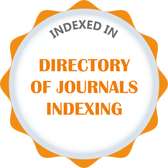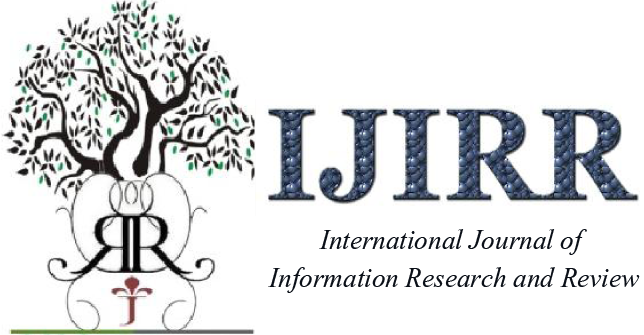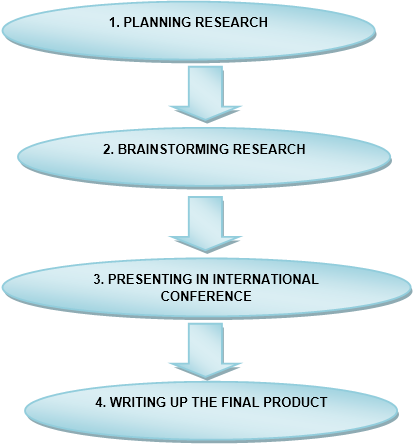Editorial
Volume 1 Issue 4 - 2017
Planning and Writing Your Research Project
Senior Consultant Orthopaedic Surgeon, National University Health System, Singapore
*Corresponding Author: Aziz Nather, Senior Consultant Orthopaedic Surgeon, National University Health System, Singapore.
Received: January 18, 2017; Published: May 08, 2017
It is important for residents and young researchers to plan and embark on research. To do this effectively they need to be guided and supervised by experienced clinicians armed with the skills and commitment to groom young researchers.
The author would like to share with residents his own formula for doing research (Figure 1).
Step 1: Planning Research
This is a meticulous and detailed process crucial to the success of the research plan. It is important to choose a suitable supervisor who can think out of the box. He should be able to guide the researcher to choose a “winning idea” – one with clinical impact on medical practice. It is then of paramount importance to do a literature review. Research must never be done in a vacuum. Review of literature is an art to be mastered. It must be extensive. The process involves procurement of articles, reading and critical analysis, ranking, summarising the salient points of each article and documentation. In the ranking of journals, the three important criteria are absolute citation frequency, immediacy index and the impact factor. Level of evidence must be ranked-systematic reviews followed by meta-analyses, randomised controlled trials, cohort studies, case-control studies to case series and case reports etc.
This is a meticulous and detailed process crucial to the success of the research plan. It is important to choose a suitable supervisor who can think out of the box. He should be able to guide the researcher to choose a “winning idea” – one with clinical impact on medical practice. It is then of paramount importance to do a literature review. Research must never be done in a vacuum. Review of literature is an art to be mastered. It must be extensive. The process involves procurement of articles, reading and critical analysis, ranking, summarising the salient points of each article and documentation. In the ranking of journals, the three important criteria are absolute citation frequency, immediacy index and the impact factor. Level of evidence must be ranked-systematic reviews followed by meta-analyses, randomised controlled trials, cohort studies, case-control studies to case series and case reports etc.
Ethical considerations must be borne in mind when designing a research project, be it clinical, cadaveric or animal research. Approval must first be sought from the relevant ethics committee.
The hypothesis must be carefully formatted and the objectives outlined clearly. The methodology must then be clearly worked out in every detail and the study population chosen with the help of a statistician from the very start of the experiment. The statistician must be involved early to advise on adequacy of study population size, ensure representative sampling and finally to evaluate the statistical significance of the results.
It is also essential to first conduct a small scale preliminary pilot study to evaluate the feasibility, time, cost, adverse effects and effect size of the research project chosen.
Step 2: Brainstorming Research
It is useful to continually brainstorm the research project throughout the different phases – ‘starting phase’, ‘middle phase’ and ‘completed phase’. Different forums can be used–eg. quarterly research presentations in the department to national conferences in the special field pertinent to the study etc. Such detailed brainstorming will give valuable feedback to shape the research process from the very start.
It is useful to continually brainstorm the research project throughout the different phases – ‘starting phase’, ‘middle phase’ and ‘completed phase’. Different forums can be used–eg. quarterly research presentations in the department to national conferences in the special field pertinent to the study etc. Such detailed brainstorming will give valuable feedback to shape the research process from the very start.
Step 3: Presentation in International Conference
Next, it would be very useful to gain wider feedback from experts in the field of study in an international forum. This will further fine tune and smoothen the progress of the research to ensure a good outcome.
Next, it would be very useful to gain wider feedback from experts in the field of study in an international forum. This will further fine tune and smoothen the progress of the research to ensure a good outcome.
Step 4: Writing the Finished Product
One must not stop at just presenting research in conferences. The research work must be written as a finished product and submitted for publication in an internationally refereed journal chosen. The research project will only be successful if it can produce at least one publication in a Tier 1 or Tier 2 internationally refereed journal. After all the most objective parameter in evaluating the research output of an individual is his list of publications achieved – in particular the number of first authored articles he has in Tier 1 or Tier 2 journals.
One must not stop at just presenting research in conferences. The research work must be written as a finished product and submitted for publication in an internationally refereed journal chosen. The research project will only be successful if it can produce at least one publication in a Tier 1 or Tier 2 internationally refereed journal. After all the most objective parameter in evaluating the research output of an individual is his list of publications achieved – in particular the number of first authored articles he has in Tier 1 or Tier 2 journals.
Final Piece of Advice
I would like to leave this final piece of advice especially for all young researchers embarking on research for the first time: …… “Research is lovely and exciting. Persevere. Stay focused and committed and you will succeed. The joy you get when the research is successful and completed is well worth the trouble you encountered”…… I wish all young researchers every success in their journey on research.
I would like to leave this final piece of advice especially for all young researchers embarking on research for the first time: …… “Research is lovely and exciting. Persevere. Stay focused and committed and you will succeed. The joy you get when the research is successful and completed is well worth the trouble you encountered”…… I wish all young researchers every success in their journey on research.
References
- Planning Your Research and How to Write It. A Nather (ed). World Scientific. 2016. New Jersey. London. Singapore. Beijing. Shanghai. Hong Kong. Taipei. Chennai.
Citation:
Aziz Nather. “Planning and Writing Your Research Project”. Orthopaedic Surgery and Traumatology 1.4 (2017): 124-125.
Copyright: © 2017 Aziz Nather. This is an open-access article distributed under the terms of the Creative Commons Attribution License, which permits unrestricted use, distribution, and reproduction in any medium, provided the original author and source are credited.




































 Scientia Ricerca is licensed and content of this site is available under a Creative Commons Attribution 4.0 International License.
Scientia Ricerca is licensed and content of this site is available under a Creative Commons Attribution 4.0 International License.